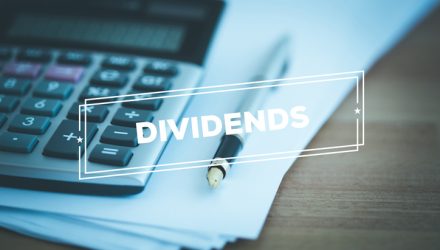Dividend stocks frequently sport multiples in excess of the broader market, but dividend growth, accessible via the ProShares S&P 500 Aristocrats ETF (CBOE: NOBL), may also be showing reasonable pricing in the current environment.
NOBL tracks the S&P 500 Dividend Aristocrats Index, targets the cream of the crop, only selecting components that have increased their dividends for at least 25 consecutive years. Consequently, investors are left with a portfolio of high-quality, sustainable dividend payers.
“Many higher-yielding dividend stocks are facing short-term headwinds, owing to their value investing traits, but the outlook is better over the long term thanks to solid macroeconomic fundamentals,” reports Lawrence Strauss for Barron’s.
The S&P 500 is trading for just over 18.5x expected earnings. That’s not alarmingly high, but it’s higher than the 15x seen a year ago, prompting some talk that some corners of the market are getting pricey. Home to a dividend yield of that tops that of the S&P 500 and a price-to-earnings ratio of 19.77, NOBL doesn’t appear overly stretched on valuation compared to broader benchmarks. Plus, it has benefits plain vanilla strategies lack.
Notable NOBL Perks
Low yields on bonds are constructive for dividend stocks and funds, including NOBL. That notion was confirmed by a recent 30-year Treasury auction that saw the government sell debt at one of the lowest yields on record.
“The 10-year Treasury note’s yield was recently at around 1.63%, down from 1.92% at the end of last year. The S&P 500’s yield, which has declined as stock prices have climbed, was at 1.8% recently and is more attractive than what the Treasury note offers,” according to Barron’s.
Improving earnings growth could bolster dividend growth in 2020. Investors should consider quality dividend growth stocks that typically exhibit stable earnings, solid fundamentals, strong histories of profit and growth, commitment to shareholders, and management team convection in their businesses.
NOBL allocates about 24% of its combined weight to materials and financial services stocks, groups that trade at discounts to the S&P 500. Industrials, the fund’s largest sector exposure at 21.68%, have also seen valuations come in a bit in recent months.
NOBL gives investors a portfolio of high-quality, sustainable dividend payers as opposed to more high-yield focused funds that may contain companies on more precarious financial positions. The fund is trading slightly higher to start in 2020.
For more on core investing strategies, visit our Core ETF Channel.
The opinions and forecasts expressed herein are solely those of Tom Lydon, and may not actually come to pass. Information on this site should not be used or construed as an offer to sell, a solicitation of an offer to buy, or a recommendation for any product.

